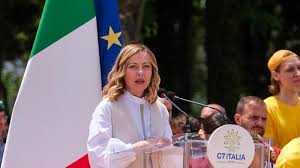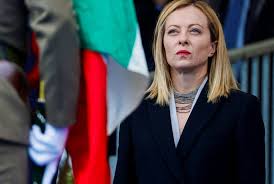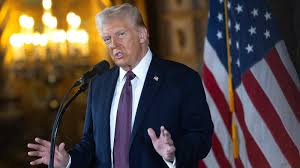Italy: PM says fascism is ‘consigned to history’

Mark Lowen – BBC
Milan: They line up in military-like formation: a thousand strong, most dressed in black, some with tattoos on shaved scalps.
At the spot in Milan where Sergio Ramelli, a far-right student, was killed almost 50 years ago by anti-fascists, a leader summons his battalion of loyalists to attention. He shouts “camerata”, or “brother-in-arms”, and Ramelli’s name, as if delivering a roll-call. And then it comes: stiff right arms outstretched and raised, palms facing down, the fascist salute in the heart of Italy’s second city, and the crowd reply on the dead man’s behalf with a roar: “Present! Present! Present!”
It’s 2024, but this has frightening echoes of a century ago. While it may seem extraordinary to an outsider – and it was staggering to me, watching it close up – it is not out of the ordinary in Italy, where commemorations of this type take place every year.
Italy’s current government is led by the Brothers of Italy party, which has roots in post-war fascism. Its leader, Prime Minister Giorgia Meloni, has said her movement has completely changed and it is clear her politics are not those of the people raising their arms in Milan. But some fear she and her party have not moved far enough away from their political origins and that what was once considered the extreme is becoming mainstream.
“Fascism did not die in 1945 – it was militarily defeated but it continued to live in the mind of many Italians,” says Paolo Berizzi, a journalist for the Italian daily newspaper La Repubblica. He has lived under 24-hour police protection for the past five years, after receiving threats from extremist groups. “Italy has never truly come to terms with its past,” he says.

It’s now more than a century since the country’s fascist dictator Benito Mussolini, nicknamed Il Duce, or The Leader, swept to power. His totalitarian regime was marked by a brutal repression of all opponents, concentration camps and invasions abroad. Antisemitic laws persecuted Jews, and after Mussolini allied with Hitler’s Germany, thousands were sent to their deaths during the Holocaust. Italy capitulated to the Allies, plunged into civil war and Il Duce was eventually captured and killed.
The country’s post-war constitution banned Mussolini’s fascist party, but the movement was allowed to continue in different guises. The Movimento Sociale Italiano, or MSI, was set up by the dictator’s supporters with the aim of reviving fascism and fighting communism. Officials from Mussolini’s regime took jobs in state institutions. Not a single Italian was brought before war crimes tribunals.
A 1952 addition to the constitution, called the Scelba Law, prohibited groups that pursued anti-democratic aims, glorified the principles or leaders of fascism, or used violence in its service. But it has rarely been invoked. In Germany, the law is clear that making the fascist salute is punishable by up to three years in prison. In Italy, however, it is left up to judges to decide whether the gesture is a criminal offence: a grey area that means its use has continued.
For decades, neo-fascist politicians were largely sidelined. But the decision by then-prime minister Silvio Berlusconi to bring them into his coalition in 1994 marked the start of their growing legitimisation in public opinion.
Prime Minister Giorgia Meloni, whose political life began in the MSI youth wing and was the national leader of its successor movement, once praised Mussolini as “a good politician”, adding that “everything he did, he did for Italy”. In 2008, Mr Berlusconi appointed her a government minister.
Ms Meloni’s Brothers of Italy party bears the same three-coloured flame logo adopted by neo-fascist groupings after the war, but she has progressively shifted her movement away from the far right.
Her previous rhetoric against “ethnic substitution” of Italians by migrants, and a supposed “LGBT lobby”, has softened since her election as Prime Minister in 2022. She now uses language more aligned with the mainstream European right, such as talk of protecting borders and boosting Italy’s birth rate.
She has dropped her criticism of the Eurozone, has formed close relationships with leaders from Washington to Brussels, and has been forthright in her support for Ukraine after its invasion by Russia. But her critics say she still winks to her political roots.
And that, some believe, makes her even less likely to support a crackdown on extremist groups. Many feel the Scelba law should have been applied in 2021, after the headquarters of Italy’s main trade union, CGIL, was violently attacked during a protest against Covid restrictions by a crowd that included members of Forza Nuova, a fringe far-right party. Demonstrators smashed windows and tried to force themselves into the building in a move reminiscent of Mussolini’s era, when the unions were attacked by his blackshirt mobs.
Forza Nuova, which has been around for more than a quarter of a century, is much further to the right than Ms Meloni’s party, advocating a total halt to immigration, and leaving NATO and the EU. Its members speak warmly of Vladimir Putin.
The party has never attracted enough votes to have MPs elected to parliament but its visibility in protests and the actions of its members, including violence against immigrants, make it and other extremist groups a thorn in the side of Italian politics. At a recent funeral, a member’s coffin was draped in a swastika flag. The birthday of another official was celebrated with a cake decorated by a swastika and the Nazi slogan “Sieg Heil”.
Forza Nuova’s founder, Roberto Fiore, tells me the party attacked CGIL because the union had backed mandatory Covid vaccination certificates for all workers. “Everyone thought of us as real freedom fighters, not fascists attacking a trade union,” he claims.
I challenge him directly: Is he a fascist? “If you asked me like that, I probably would say yes,” he replies, “but I have to complete the term and say I’m a revolutionary. Italy hasn’t got the intelligence and the courage to say, well OK, fascism was good on this and that and maybe not good in other things… I accept, I don’t refuse the term of fascism.”
Over the course of our interview, I push Mr Fiore on the criminal nature of Mussolini’s regime. He denies it was violent, and claims that fascist internment camps were “things that happen with war”. He goes on to say that Ukraine should be part of Russia. When I put it to him that his party would be banned in countries such as Germany, he says: “Freedom is freedom.”
At Forza Nuova’s local headquarters in the northern city of Verona, the walls are draped in racist and extremist symbols, from the US Confederate flag, to those of the self-declared pro-Russian Donetsk and Luhansk People’s Republics, along with scarves bearing the words “White Power” and “We are fascists – a call to arms”. The party’s deputy leader, Luca Castellini, proudly shows me a Mussolini calendar, which he claims is the most-sold calendar in Italy.
He also heads up Verona’s “Ultras” – hardcore football fans. Italian stadiums have long been breeding grounds for political extremism. When the club, Hellas Verona, was promoted six years ago, Mr Castellini was filmed shouting jubilantly to supporters that the person who had paid for their success and gifted them victory had a name: “Adolf Hitler!” The fans cheered and began their own chant: “We’re a fantastic team in the shape of a swastika. How great it is to be trained by Rudolf Hess” – Hitler’s deputy. Mr Castellini was banned from the stadium after claiming that a black player could never be “truly Italian”.
When I confront him on all this, he says he would happily repeat the same Hitler chant, because it was ruled not to have been a crime. How would a descendant of Italian Jews deported to the Holocaust feel, I ask? “I don’t know – but wars have always existed and there have always been deaths,” he replies. “It can’t be my problem.”
Ms Meloni’s party has distanced itself from Forza Nuova. The prime minister condemned the sacking of the trade union building and Forza Nuova’s leaders openly criticise her for some of her positions, including her steadfast support for Ukraine.
And before the election, she sought to reassure critics by releasing a video message in which she said the Italian right had “consigned fascism to history” and vigorously condemned the suppression of democracy and “ignominious anti-Jewish laws”.
However, Ms Meloni has not discarded her heritage entirely: she still uses the fascist-era slogan “God, homeland, family”, for example.
“Brothers of Italy is not a fascist party – but it is an ideological heir to the post-fascist tradition,” says journalist Paolo Berizzi. Extremist groups feel legitimised by this, Mr Berizzi adds.



